【学案】八年级下册Unit7Topic2SectionC导学案
仁爱版英语八年级下册Unit7Topic2SectionC课时教学设计
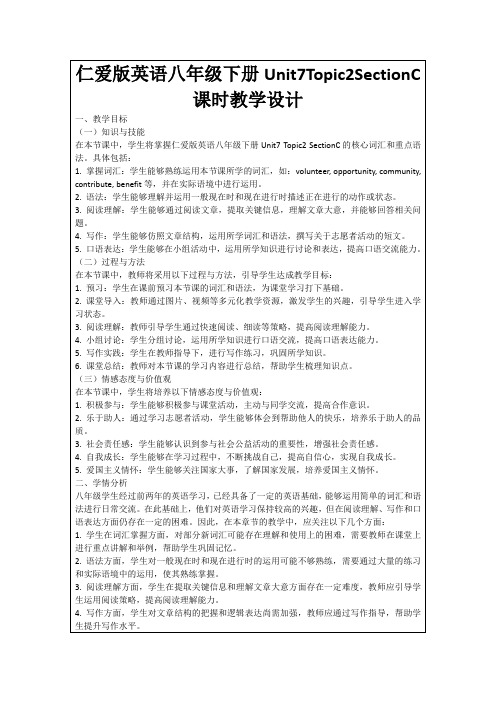
设想:教师巡回指导,关注每个学生的学习状态,提供个性化的反馈和帮助。
4.练习巩固:设计不同形式的练习,如填空、选择、改错等,帮助学生巩固所学知识。
设想:根据学生的掌握情况,适时调整练习难度和量,确保每个学生都能得到有效的练习。
5.口语作业:与家人或朋友分享本节课所学内容,讨论志愿者活动的经历或看法。学生可以通过录制视频或音频的形式,将口语作业提交给教师。
6.拓展阅读:推荐学生阅读一本与志愿者活动相关的英文书籍或观看相关纪录片,了解不同领域的志愿者活动,拓宽视野。
作业布置要求:
1.学生应按时完成作业,注意作业质量,保持书写工整、卷面整洁。
2.语法:学生能够理解并运用一般现在时和现在进行时描述正在进行的动作或状态。
3.阅读理解:学生能够通过阅读文章,提取关键信息,理解文章大意,并能够回答相关问题。
4.写作:学生能够仿照文章结构,运用所学词汇和语法,撰写关于志愿者活动的短文。
5.口语表达:学生能够在小组活动中,运用所学知识进行讨论和表达,提高口语交流能力。
4.写作方面,学生对文章结构的把握和逻辑表达尚需加强,教师应通过写作指导,帮助学生提升写作水平。
5.口语表达方面,学生在小组讨论和课堂展示中,可能存在紧张和不自信的现象,教师应鼓励学生大胆开口,增强其口语表达能力。
6.情感态度与价值观方面,八年级学生正处于青春期,具有较强的自我意识和独立思考能力,教师应结合教材内容,引导学生树立正确的价值观,培养其社会责任感。
5.课堂总结:通过师生共同总结,帮助学生梳理本节课的学习内容,强化重点知识。
设想:鼓励学生主动参与总结,通过绘制思维导图等方式,提高学生的归纳总结能力。
八年级下册unit7导学案学生版
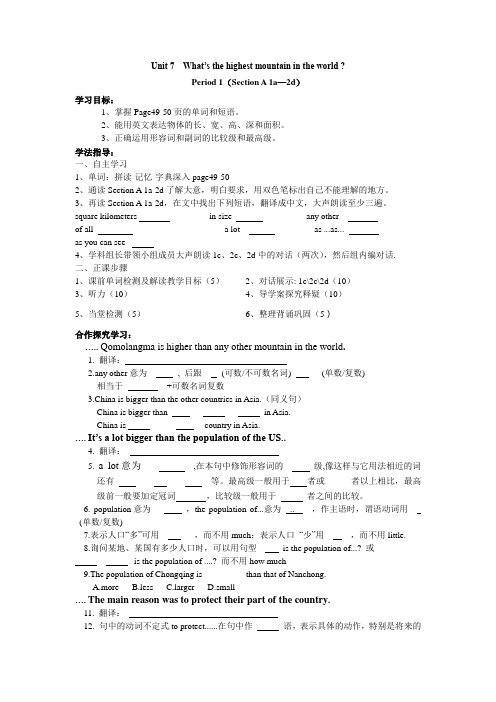
Unit 7 What’s the highest mountain in the world ?Period 1(Section A 1a—2d)学习目标:1、掌握Page49-50页的单词和短语。
2、能用英文表达物体的长、宽、高、深和面积。
3、正确运用形容词和副词的比较级和最高级。
学法指导:一、自主学习1、单词:拼读-记忆-字典深入page49-502、通读Section A 1a-2d了解大意,明白要求,用双色笔标出自己不能理解的地方。
3、再读Section A 1a-2d,在文中找出下列短语,翻译成中文,大声朗读至少三遍。
square kilometers _ ____ in size any otherof all a lot as ...as...as you can see __ ____4、学科组长带领小组成员大声朗读1c、2c、2d中的对话(两次),然后组内编对话.二、正课步骤1、课前单词检测及解读教学目标(5)2、对话展示: 1c\2c\2d(10)3、听力(10)4、导学案探究释疑(10)5、当堂检测(5)6、整理背诵巩固(5)合作探究学习:….. Qomolangma is higher than any other mountain in the world.1. 翻译:_ ________2.any other意为__ __, 后跟__ __(可数/不可数名词)__ ___(单数/复数)相当于_ ____+可数名词复数3.China is bigger than the other countries in Asia.(同义句)China is bigger than _ _ in Asia.China is _ __ _ __ country in Asia.…. It’s a lot bigger than the population of the US..4. 翻译:_ _____5. a lot意为____ __,在本句中修饰形容词的___ _级,像这样与它用法相近的词还有_ _ _ _ _ 等。
新版人教版八年级英语下unit7(Section A 3a-4c)导学案
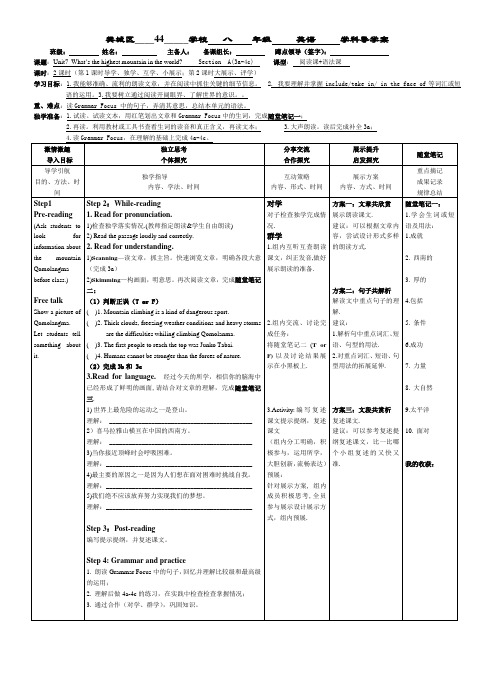
樊城区____44_____学校八年级英语学科导学案当堂测评分层达标基础落实★一、用所给单词的适当形式填空。
1. Don't give up __________ (study) English.2. The boy said they would like to challenge _______ (they).3. When we are in the face of _________ (difficult), we shouldn't give up trying ________(achieve)our dreams.4. Lucy spent two hours _________ (finish) her homework.5. Hainan is a very large Island .It is the second _________ (large) island in china.6. Our teacher is as ________ (busy) as before.7. He is ______________ (careful) among us.8. Li Lei jumped ______ (far) than Jim.9. The busier he is, the ________ (happy) he feels.发展能力★★二、完成句子。
1.The Yangtze River is______________________ (第三长河)in the world.2. The Atlantic is _______________________ ( 第二大洋)in the world.3. Lin Tao is __________________________ (最懒的学生之一)in the class because he never gets to school on time.4. Edison was_________________________(最伟大的发明家之一)in the world.提升素养★★★三、句型转换。
仁爱版八年级英语下册Unit 7 topic2导学案

Topic 2 I`m not sure whether I can cook it wellSection A编辑: 郭承雄审核:初二英语组Aims and demands1 Words and expressions.2 Talk about cyclingSteps .I. Lead in.Do you like cooking?How to make fried rice?II. Learn for themselves and communicate.1 Listen to 1a and answer some questions2 Read 1a again and find out the following expressions.1.我乐意···2.尝试做某事3.精细地切4.认真地煮5.做得好6.需要做某事7.把···放进··· 8.轻轻地炒9.慢慢地加 10.炒几分钟11.介意做某事 12.制作骨头汤III Present and give advice.1 Present their learning results in groups2 practice 1a in pairs.3 Practice 1bIV Consolidate and expand宾语从句练习1.This is the best film(今年放映的)(show)This is the best film 2.Here is a pen (你昨天丢失的)(lose)Here is a pen3.He is the most careful boy(我所知道的)(know)He is the most careful boy4.Wheat is a plant (中国北方种植的)(grow)Wheat is a plant5.I don`t know.Can I get some advice from you?(合二为一)6.I`m not sure.Will they come to help us?(合二为一)V Self-examination and checkTopic 2 I`m not sure whether I can cook it wellSection B编辑: 郭承雄审核:初二英语组Aims and demands1 Words and expressions.2 Talk about cyclingSteps .I. Lead in.Do you like cooking?How to make noodles?II. Learn for themselves and communicate.1 Listen to 1a and answer some questions2 Read 1a again and fill in the blanks about 1b.3.find out the following expressions.1.喜爱的零食2.慢慢地切3.轻轻地放4.学做某事5.做得相当好6.熟能生巧7.让某人试一试 8.礼貌地做某事9.请自便 10.把···放···上III Present and give advice.1 Present their learning results in groups2 practice 1a in pairs.3 Practice part 3IV Consolidate and expand1.这本书跟那本书一样有趣.This book is _____ _____ _____ that one.(interest)2.你游泳没有你弟弟好.You can’t swim _____ _____ _____ your brother.(good)3.陈老师比王老师受欢迎。
人教版八年级英语下册 Unit 7 Section A (2a-2d)导学案
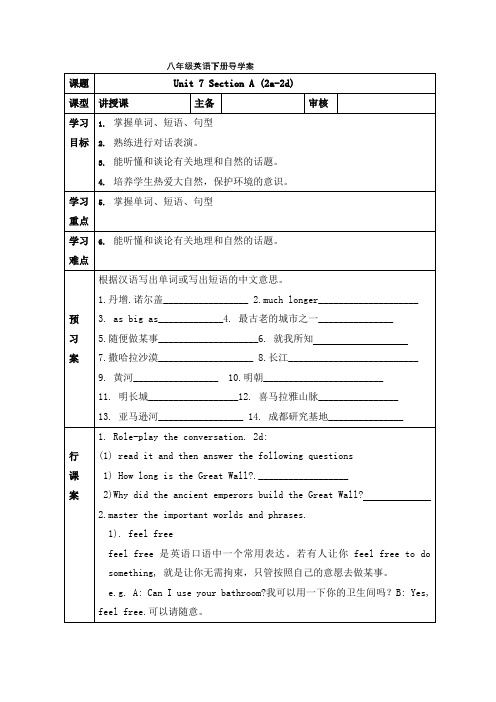
A .taller B. tallest C. the taller D. more tall
( ) 5. Which city has ________ population , Beijing , Guiyang or Chengde ?
A. How farB. how oftenC. how longD. how soon
( ) 9.—_______ have you been in the sports club?—Since the first month I came to the school.
13. 亚马逊河_________________ 14. 成都研究基地_______________
行
课
案
1. Role-play the conversation. 2d:
(1) read it and then answer the following questions
1) How long is the Great Wall?.__________________
检
测
案
单选
( )1. You are too quiet , I hope you can be ______ outgoing .
A. a little more B. too much C. much too D. much less
( )2. ________ students are standing outside .
e.g.A: Can I use your bathroom?我可以用一下你的卫生间吗?B: Yes, feel free.可以请随意。
最新人教新目标八年级下册Unit7导学案.2

Period 1(Section A 1a-2d)学习目标1.掌握并灵活运用本课的重点词汇rubbish fold sweep floor mess2.重点短语sweep the floor, work on, finish doing, take out the rubbish3.听懂“请求做家务活动”的相关话题及文章;学会有礼貌地提出请求和请求准许.自主预习案自主学习本课内容完成下列练习1.My mother told me to_______(打扫) the floor every day.2.Don’t put your answer on the chair.______(折叠) it and put it on the bed.3.Jack,can you help me c_____ the living room?4.What a m______you made! You’d better clean it up before Mum gets home.5.Let’s t_____out the rubbish and put it in the trash bin.短语1.______________洗餐具2. __________________ 倒垃圾3.fold theclothes_______________4.sweep the floor __________5.make your/the bed __________6._______________打扫客厅7.______________没问题8.___________________ 出去吃饭9.stay out late______________10.go to the movies _____________11.get aride_____________12.workon________________13.___________________做完某事14.____________________干净又整洁合作展示案1.小组合作演练1c中的对话。
英语人教版八年级下册Unit7导学案.
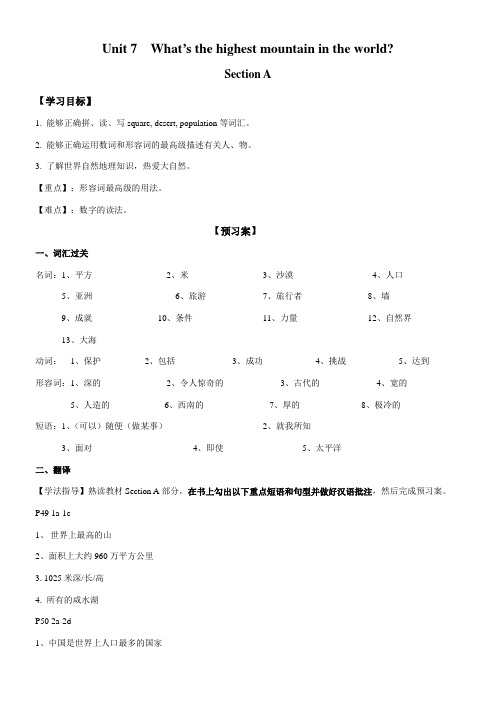
Unit 7 What’s the highest mountain in the world?Section A【学习目标】1. 能够正确拼、读、写square, desert, population等词汇。
2. 能够正确运用数词和形容词的最高级描述有关人、物。
3. 了解世界自然地理知识,热爱大自然。
【重点】:形容词最高级的用法。
【难点】:数字的读法。
【预习案】一、词汇过关名词:1、平方______ 2、米________ 3、沙漠_________ 4、人口________5、亚洲_________6、旅游_______7、旅行者________8、墙________9、成就________ 10、条件______ 11、力量_______ 12、自然界________13、大海_________动词:1、保护________ 2、包括________ 3、成功________ 4、挑战________ 5、达到_______ 形容词:1、深的_______ 2、令人惊奇的___________ 3、古代的__________ 4、宽的_________5、人造的____________6、西南的__________7、厚的___________8、极冷的___________短语:1、(可以)随便(做某事)______________ 2、就我所知_____________________3、面对____________________4、即使______________5、太平洋________________二、翻译【学法指导】熟读教材Section A部分,在书上勾出以下重点短语和句型并做好汉语批注,然后完成预习案。
P49 1a-1c1、世界上最高的山_______________________________________________________________2、面积上大约960万平方公里_______________________________________________________3. 1025米深/长/高___________________________________________________________________4. 所有的咸水湖____________________________________________________________________P50 2a-2d1、中国是世界上人口最多的国家____________________2. 随便问我关于....事情_____________________________3. 明朝_________________________________ 4、古代皇帝____________________5、正如你所看见的_______________________6、据我所知____________________7、其它的人造物体______________________________8、主要原因是为了保护国家领土._____________________________________________________________P51 3a-3c1. 世界上最危险的运动之一___________________________2、绵延于中国西南地区_____________________________________________3. 当悄到达山顶时,你也感到呼吸困难_____________________________________________________________4. 第一批到达山顶的人_______________________5. 用生命冒险___________________________6. 挑战他们自己_____________________________7. 在面对困难时________________________8. 自然界的力量_____________________9. 浓云覆盖着山顶,雪可能下得很大。
人教版八年级英语下册教案 Unit 7 单元导学

Unit7 What'sthehighestmountainintheworld?
1.本单元话题以“世界各种自然与地理知识”展开,情境属于新课标“人与自然”主题范畴中的“自然生态”这一主题群,涉及子主题“世界主要国家的地理位置,不同地区的生态特征与自然景观”和“热爱与敬畏自然,与自然和谐共生”。
2.单元主题体现《中国学生发展核心素养》中的“社会参与”方面,提升学生的“责任担当”这一素养,立足于“社会责任”这一基本要点。
3.了解一些我国和世界“自然地理之最”的知识。
4.了解我国明长城的基本知识。
5.了解珠穆朗玛峰及人类克服困难、挑战极限的精神。
6.了解国宝大熊猫及动物保护。
7.能熟练运用形容词和副词的比较级、最高级。
续表
【课时建议】本单元建议5课时
SectionA(1a-2d)(一课时)
SectionA (3a-3c)(一课时)
SectionA(GrammarFocus-4c)(一课时)
SectionB(1a-1d)(一课时)
SectionB(2a-SelfCheck)(一课时)
词汇短语:主要采用图片及多媒体展示助记法。
基本句子:采用多媒体展示及交际法(利用多媒体两人进行交际时的情景)。
语法:就本单元话题“Talk about geography and nature”运用will 引导的一般将来时预测未来,采用freetalk加深印象。
- 1、下载文档前请自行甄别文档内容的完整性,平台不提供额外的编辑、内容补充、找答案等附加服务。
- 2、"仅部分预览"的文档,不可在线预览部分如存在完整性等问题,可反馈申请退款(可完整预览的文档不适用该条件!)。
- 3、如文档侵犯您的权益,请联系客服反馈,我们会尽快为您处理(人工客服工作时间:9:00-18:30)。
八年级下册Unit7Topic2SectionC导学案
第一部分:课堂同步学习材料预习
I.Learning Objectives(学习目标)
1. Some new words:
formal, manner, lap, dine, polite/impolite, loudly/quietly, napkin, fork, dish, spoon, chopstick
2.Some phrases:
for the first time, eat up., table manners, drink to sb. remember to do.
3. Talk about table manners for a formal western dinner party.
4. Talk about table manners in different countries
5. 能演示并用英语谈论及简述西餐餐桌礼仪。
了解不同国家的餐桌礼仪, 写出简单的文段。
6. 互帮互学,开阔视野。
乐于接触和了解外国风俗文化,从而更好地为弘扬中国文化服务。
II.预习指导(课文67页)
1.Look at the picture and write the words on the lines. (看图填词)
2.How to start a formal western dinner ?(讨论西方餐桌礼仪)
3.完成课文67页1b Read 1a and mark T (True) or F(False).
4.Read 1a again and fill out the table.
5.Learn key points of 1a in group(小组合作学习1a知识点)
1)Underline the key points (划出重要词组和句子)
for the first time 第一次table manners 餐桌礼仪
start doing sth 开始做start with 以。
开始
eat up sth./eat sth. up 吃完,吃光drink to sb./sth.为......干杯remember (not)to do sth.记得(不)要做某事(事情还没有做)
It’s polite to follow them. It’s polite to eat up…
Maybe you don’t know whether it’s polite or not to speak lo udly at the table.
2)Key sentences about western table manners (划出关于西方餐桌礼仪的句子)
3)Talk about table manners in different countries.
4)How to write a composition?(写作技巧指导)
Beginning – Body – Ending
5)Write a passage “Table Manners in Different Countries”.
第二部分:当堂训练及课后提高练习
I.根据句意及汉语提示填空。
1.Tom likes fruit very much, and he often _________ (吃光) ten apples
in a few minutes.
2. If you go to a formal western dinner party for the f irst time, you’d better know about western ______________ (餐桌礼节).
3. Our English class often _________________ (以……开始) a lively song, so we all like it.
4. When he was _________ (为……干杯) me, I gave him a hug. III.完形填空
People in different countries have different ways of doing things. Something is 1 in one country, but it may be quite impolite in another. In Britain, you mustn’t lift your bowl to your 2 when you are having some liquid(液体) food. But it’s 3 in China. And in Japan you even needn’t worry about making 4 while you are having it. It shows that you’re enjoying it. But people in Britain think it is bad manners. If you are a visitor in Mongolia, what manners do they wish 5 to have? They wish you to have a loud “burp”(打嗝) 6 you
finish eating. Burping shows that you like the food.
In Britain, you should try not to 7 your hands on the table when you’re having a meal. In Mexico, however, guests may keep their hands on the table during a meal. But in Arab(阿拉伯) countries you must be very careful with your hands. You 8 eat with your left hand. Arabs consider(认为) it very 9 manners eating with left hands. So when you are in other countries, 10 carefully and follow them. As a saying goes, “Do as the Romans do. ”
( )1. A. bad B. useful C. terrible D. polite
( )2. A. mouth B. nose C. ears D. eyes
( )3. A. same B. different C. important D. difficult
( )4. A. faces B. noises C. mistakes D. friends
( )5. A. them B. her C. you D. him
( )6. A. after B. before C. if D. until
( )7. A. give B. take C. bring D. put
( )8. A. needn’t B. must not C. shouldn’t D. may not
( )9. A. different B. important C. good D. bad
( )10. A. see B. look C. read D. watch
第三部分:自我评价。
